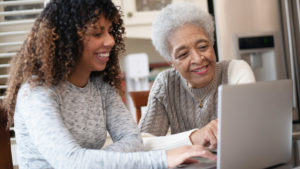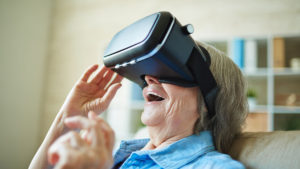Donor Impacts on Care
Over the past few years, the pandemic has shaped our lives. Our generous community of supporters helped Baycrest quickly adapt to circumstances and accelerate plans for improvements to healthcare.
As a result, we have discovered and adopted new ways to care, research and educate that will outlast these difficult times.

eVisits, Telemedicine: Donors provided Baycrest with funds, data plans and tech equipment that facilitated eVisits and Telemedicine visits. These resources continue to play a role in programming and connecting with family, friends and physicians.
Arts and Culture: Residents, adult day program members, Baycrest@Home clients and the Azrieli Foundation Café Europa group for Holocaust survivors stay in touch virtually for concerts and programs, almost entirely supported by donors.
 Baycrest@Home: A unique combination of activities, stimulation and education helps older adults stay active and connected at home, along with support from social workers and recreational therapists.
Baycrest@Home: A unique combination of activities, stimulation and education helps older adults stay active and connected at home, along with support from social workers and recreational therapists.
Webinars: A webinar series provides information and support to thousands of family caregivers since the pandemic began.
Tech Training for Older Adults: Donor funding supported curriculum development and a pilot course. Our Baycrest Innovation Office team assists older adults at Toronto Seniors Housing complexes, members of the Holocaust survivors group and others.

New technologies: Virtual Reality (VR) and the use of a projection gaming system are among the new technologies that engage, stimulate and entertain residents and patients.
Virtual Memory Clinic: Donor support helped to facilitate telemedicine appointments at the Sam and Ida Ross Memory Clinic. Concurrently, the Virtual Behavioural Medicine (VBM) program was established to help dementia patients in acute-care hospitals, at home or in long-term care homes in various locations.
We are grateful to hundreds of donors to the Safeguarding our Seniors (SOS) campaign during the pandemic.